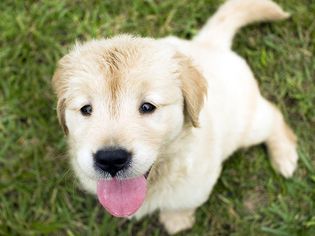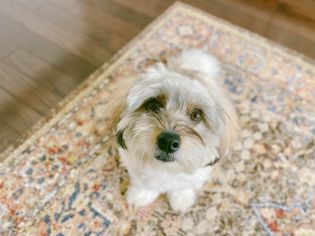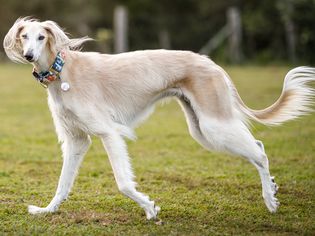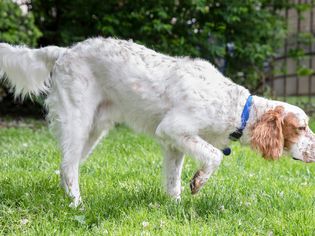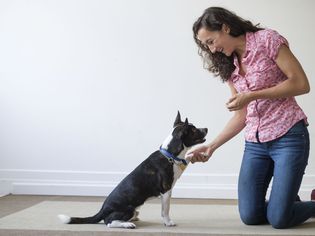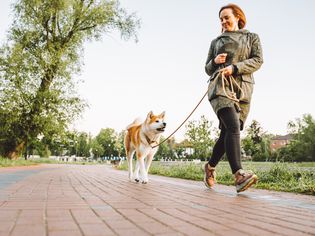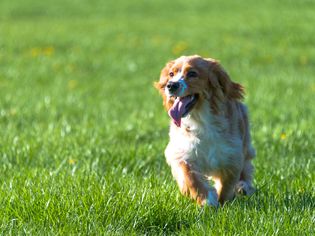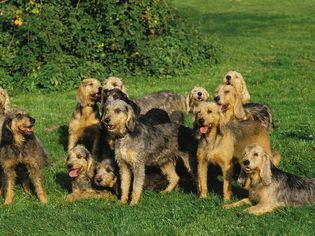The poochon is a small, non-shedding dog that is a cross between the bichon frise with the toy or miniature poodle; colors include white, black, cream, apricot, red, silver, and brown. This hybrid mix is sometimes referred to as a bichon poo or a bichpoo. The poochon’s looks and temperament are variable as this is not a standardized breed but a mix of two different breeds. Most poochons share many of the same traits as the bichon frise and poodle. Since both bichons and poodles are friendly and intelligent breeds, the poochon is generally smart, trainable, affectionate, and outgoing. However, every poochon is an individual, and each dog will have a unique personality.
Poochons are said to be hypoallergenic, but remember there is no such thing as a truly hypoallergenic dog. Keep in mind that a poochon’s curly coat requires significant upkeep, including daily brushing and regular professional grooming, which comes at an expense.
Breed Overview
Other names: Bichpoo, bichon poo, and bichon poodle
Group: Hybrid
Weight: About 6 to 20 pounds
Height: About 9 to 15 inches tall at the shoulder
Coat color: Curly, coarse, and dense. May or may not have an undercoat. Usually solid colors; may be white, black, cream, apricot, red, brown, or silver.
Life Span: Variable, but usually around 10 to 18 years
Hypoallergenic: Yes
Origin: Australia
Characteristics of the Poochon
The poochon is likely to have a similar temperament as the parent breeds, the bichon frise and the poodle. This means poochons are generally sweet, affectionate, lively, and playful. However, every poochon is an individual, and each dog will have a unique personality.
Some poochons might be more on the calm and quiet side, and others might be more energetic and outgoing. Most poochons are so dependent on human company that they don't do well in households where they must be alone for many hours a day. Like poodles and bichons, poochons can be alert to sounds; some might bark a bit more than is necessary.
| Affection Level | High |
| Friendliness | High |
| Kid-Friendly | Medium |
| Pet-Friendly | High |
| Exercise Needs | Medium |
| Playfulness | High |
| Energy Level | Medium |
| Trainability | High |
| Intelligence | High |
| Tendency to Bark | Medium |
| Amount of Shedding | Low |
History of the Poochon
The history of the poochon is not well recorded. However, the first poochons were likely created in the 1990s in Australia as part of the wave of “doodle” breeding that occurred after the Labradoodle was created.
Purebred dogs have been bred for generations following a special blueprint called the breed standard, which is the written description of the ideal physical and temperamental traits of the breed. The breed standard is what gives purebred dogs predictable height and weight, body structure, color, coat type, and temperament.
The poochon is a hybrid and not a purebred dog, so they do not have a breed standard and they are not standardized. This means that there is a lot of variation in the way individual poochons might look and act. A poochon that is a 50-50 cross between a purebred bichon frise and a purebred poodle might look more like a bichon or more like a poodle, or could look different from both breeds. That said, these parent breeds are more similar than different, both in looks and temperament, so poochons are likely to look and act in a similar manner to the parent breeds.
Some might question the reasoning behind breeding together such similar breeds. Though the claim of “hybrid vigor” is often cited as allowing for better health, this is more applicable for dogs with many different breeds in their background and not the case with crossing two purebred dogs. Crossbred puppies have the potential of inheriting congenital diseases and disorders present in both parent breeds.
The poochon is not recognized by any of the purebred dog registries such as the American Kennel Club or United Kennel Club.
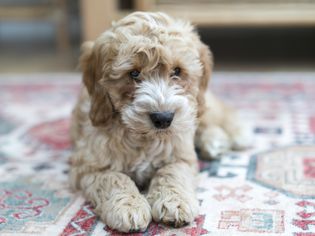
Poochon Care
Grooming requirements for the poochon are the same as those for the bichon frise and poodle. The curly, dense coat of the poochon sheds very little or not at all, but daily brushing or brushing every other day is necessary to remove loose hair from the coat and prevent matting.
Grooming
Poochons with undercoats likely need more frequent brushing than poochons with single coats. Like their parent breeds, poochons need haircuts from a professional groomer every four to eight weeks. In addition to brushing and grooming, trim your poochon’s nails every other week and take a look inside their ears on a weekly basis to make sure all is well. Clean the ears with a pet safe ear cleaner if they look dirty. If you see excessive dirt or redness in the ears, or if your poochon is shaking its head or scratching at the ears, schedule a veterinary visit.
Exercise
Both parent breeds of the poochon are lively and energetic, but poochons are small enough to get enough exercise through one or two daily walks plus playtime with you inside or outdoors. Some poochons are athletic and might enjoy training for dog sports like agility and flyball.
Training
Like the bichon and poodle, poochons are extremely smart and trainable. Bichons were once famous as circus dogs performing charming tricks, and poodles are considered one of the smartest breeds. Poochons respond readily to positive training methods like clicker training along with tasty treats and other food rewards.
Common Health Problems
Although many people who breed and sell hybrid dogs claim that crossing two different purebred dogs automatically makes healthier puppies, science tells us that genes don’t necessarily work this way. Most purebred dogs have specific inherited health issues common to the breed. Crossing bichons with poodles means that poochon puppies are at risk of inheriting any of the genetic diseases found in either breed.
The bichon frise is prone to:
- Allergies
- Bladder infections
- Ear infections
- Dental disease
- Luxating patellas (slipping kneecaps)
- Cataracts and other eye diseases
Poodles are affected by:
- Hip dysplasia
- Eye disease
- Idiopathic epilepsy
- Sebaceous adenitis
- Von Willebrand’s disease
- Immune-mediated disorders
- Legg-Calve-Perthes disease (a hip joint disorder)
- Luxating patellas
- Sebaceous adenitis (an inflammatory skin disease)
Responsible breeders use healthy, well-bred adult purebred dogs for breeding, and test them for the genetic diseases common to their breed to avoid passing on health problems to the puppies. Reputable breeders should also offer a health guarantee on their poochon puppies should the puppy develop a genetically linked disease later in life.
Diet and Nutrition
To prevent overeating, feed your poochon measured meals twice a day rather than leaving food out all the time. Keeping your poochon lean can help prevent the development or worsening of joint disorders like luxating patellas, to which the poochon is prone, as well as other weight-related health issues like diabetes. Talk to your veterinarian for a recommendation on a healthy food to feed your poochon, as well as how much to feed.
Where to Adopt or Buy a Poochon
If you’re thinking about adding a poochon to the family, you can first check your local animal shelters and rescue organizations for poochons in need of new homes. This is a great option if you don’t mind adopting an adult dog, since most poochons in rescue are adults. Occasionally, you might find a poochon puppy in a shelter or rescue environment, but it’s more rare.
If you have your heart set on a poochon puppy, your best option is finding a responsible breeder who tests their breeding dogs for health issues common to both the bichon frise and poodle. Watch out for puppy mills, which are common with "designer" dog breeds.
Poochon Overview
Pros and Cons
Intelligent and trainable
Affectionate and friendly
Nonshedding and hypoallergenic
Doesn’t do well if left alone a lot
Some may be excessive barkers
Needs regular professional grooming
More Dog Breeds and Further Research
If you like the poochon, you might also like these breeds:
- Goldendoodle
- Havanese
- Shih tzu
- Shih-poo
Otherwise, check out all of our other dog breed articles to help you find the perfect dog for you and your family.
- Do poochon dogs bark a lot?
Yes, poochon dogs are very alert to sounds and can bark a little more than necessary at times.
Can a poochon be left alone?Poochon dogs do not like to be left alone. If left alone too long, they can develop separation anxiety.
Is a poochon a good family dog?Yes, poochons make good family dogs. They are very social and affectionate dogs.

